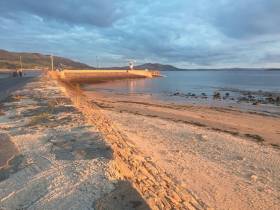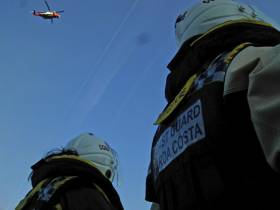Displaying items by tag: inquest
Inquest Into Death of Irish Coast Guard Volunteer Caitríona Lucas Hears Harrowing Details
As the full inquest into the death of Irish Coast Guard volunteer Caitríona Lucas continued on Tuesday (28 November), two survivors of the RIB capsize off Co Clare which claimed her life have described how the three were tossed into the sea.
The Irish Independent reports that survivor Jenny Carway told the inquest that had Lucas’ helmet not been ripped off by a freak wave, she might have survived the incident.
Fellow survivor James Lucey told the full inquest held by Limerick coroner John McNamara at Kilmallock courthouse that the sea was “like a washing machine”.
As Afloat.ie reported, Lucas, a 41-year old librarian and mother of two, died after a Kilkee Coast Guard RIB capsized during a search for a missing man on 12 September 2016.
The highly experienced member of Doolin Coast Guard, who had been assisting the neighbouring unit at Kilkee in the search, was the first Irish Coast Guard volunteer to lose her life during a tasking.
When she was recovered from the sea by helicopter, having lost consciousness, she was not wearing her helmet, her lifejacket was not fully inflated and she had sustained an injury to her head.
The coroner and a jury of four men and three women were told that the Kilkee unit were short of volunteers for sea operations that day and had asked assistance from the Doolin unit.
The Kilkee RIB with Lucas, James Lucey and Jenny Carway approached Lookout Bay and Intrinsic Bay near Kilkee around 1pm on 12 September 2016.
The inquest was told that the crew had not been made aware of the fact that Intrinsic Bay could witness “peculiar” waves — and that vessels reversed into the inlet for safety reasons.
They were also unaware of any specific dangers posed by the waters involved, with sea conditions much better than the previous day.
Lucey said they were “moving along slowly” when they were hit by a wall of water and the RIB capsized. He was able to clamber onto a rock, was swept off, but then managed to reach a ledge in a sea cave which he was later rescued from.
He described seeing Lucas floating on her back with her face upwards, shouted to her to try to stand, and then saw her floating face down in the water when he looked again.
“Caitríona shouted ‘breaking wave’. I barely got to move my head around when I saw the water,” the newspaper quoted Jenny Carway as telling the inquest.
Carway managed to keep her helmet but the helmets of Lucey and Lucas had been ripped off by the force of the water. She described how her helmet was loose-fitting but she had used an inflatable bladder to tighten it and firmly adjusted the chin strap.
“It [the helmet] could have been the difference between her being here today and not,” Carway told the inquest.
Marine expert Michael Kingston, representing the Lucas family, put it to Carway that drone rescue footage which has been made available to the inquest shows what happened to Lucas without her helmet.
“Ms Lucas can be seen [on the drone footage] being struck by the boat and rocks, rendering her unconscious,” he said.
Read the Irish Independent HERE.
Driver Three Times Over Legal Alcohol Limit In Buncrana Pier Tragedy, Inquest Hears
#Buncrana - An inquest into the Buncrana slipway tragedy of March 2016 has found that the driver of the car that slipped into Lough Swilly was more than three times over the drink-driving limit.
As previously reported on Afloat.ie, five people died after their car slipped into the water from a pier in Buncrana, Co Donegal on Sunday 20 March.
Sean McGrotty (49) was driving the car with his sons Mark (12) and Evan (8), his baby daughter Rioghnach-Ann, the children’s grandmother Ruth Daniels (59) and her daughter Jodi-Lee (14), according to The Irish Times.
Only Rioghnach-Ann was rescued from the car, thanks to the quick actions of local GAA player Davitt Walsh — who received a silver medal in the 2016 National Bravery Awards for his efforts.
Walsh told the inquest of his difficulties in getting back up the slipway from the water due to its coating of algae, noting that its slipperiness might not be obvious to people unfamiliar with the area.
Local man Francis Crawford also spoke at the inquest, recounting how he called to McGrotty has he saw the car slowly entering into the water at the bottom of the slipway, which was “slippery as ice” with algae.
“I was hoping that the emergency services would arrive and the car would not go down,” he said, adding that he believed it had been in the water for around 12 minutes before it sank.
McGrotty’s partner Louise James, who was away at the time of the incident, said through her solicitor: “I firmly believe the slipway should have been closed to the public or else proper warning signs displayed. It was an accident waiting to happen.”
The Irish Times has much more on the story HERE.
Fall From Helicopter Winch ‘Unlikely’ To Have Led To Death In Hook Head Rescue Tragedy
#Coastguard - The Irish Coast Guard crew winching two teenagers from the sea when one fell from her harness had never lifted two casualties at the same time before, as BreakingNews.ie reports.
Aoife Winterlich, 14, was one of four teenagers who had been swept into the sea off Hook Head during an outing for venture scouts on 6 December 2015.
Two managed to swim ashore but Winterlich got into difficulty in heavy seas. The fourth, a 15-year-old boy, attempted to keep her afloat until rescue arrived minutes later.
It was when Rescue 117’s crew attempted to transfer the pair into the helicopter that Winterlich slipped from her strop some 45 feet back into the water.
Records show that the winchman was back in the water to retrieve Winterlich within moments, and that she was in the helicopter just over a minute after.
The inquest into Winterlich’s death this week heard that she died from lack of oxygen to the brain resulting from near drowning, and that there was no evidence of contributing physical trauma.
Prof Maureen O’Sullivan of Our Lady’s Children’s Hospital in Crumlin, who conducted the post-mortem, said the fall was unlikely to have contributed to Winterlich’s death, according to RTÉ News.
The inquest also heard that the coastguard helicopter’s winchman and winch operator had never performed a lift of more than one casualty in a single lift.
Winch operator Neville Murphy told Dublin Coroner’s Court the situation that led his college Sean Jennings to descend with two winch strops was “unprecedented”.
“Two people in the water, that generally doesn’t happen,” he said. “We can only train to certain limits. We can never know what we are faced with as we look out the door of the aircraft.”
Earlier this year, the Air Accident Investigation Unit report into the incident concluded there was “nothing to suggest that the winchman’s decision-making was anything other than sound”.
The inquest is adjourned till October. BreakingNews.ie has more on the story HERE.
Inquest Hears Man Drowned After Dinghy Capsized
Two children looked on in horror as their father tried to save a drowning man, an inquest has heard in Belfast.
As the Belfast Telegraph reports, the family and a friend were thrown into Strangford Lough when their dinghy capsized some 500 yards from Newtownards Sailing Club on 12 June last year.
David Allen managed to pull his friend Ken Dorman to safety and performed mouth-to-mouth resuscitation while still in the water.
But Dorman, 51, had been shocked by the cold water and swallowed some, which caused him to drown, ruled coroner John Leckey.
Allen described his friend as strong and a good swimmer, and told of his shock when he saw him floating on his back unmoving after he was unable to inflate his buoyancy aid.
"He did not make any attempt to move at all and that is what I struggle with," said Allen. "I think there was something stopping him from doing anything."
The Belfast Telegraph has more on the story HERE.
Boat Owner 'Aware of Poor Wiring' Before Drowning Tragedy
Problems with electrical wiring had been alerted to a retired mariner who drowned along with two friends after abandoning their boat due to a fire, an inquest into the tragedy has heard.
Wolfgang Schmidt (70), Richard Harmon (69) and Wolfgang Schröder (62) all died from drowning near Adrigole Harbour in Bantry Bay on 16 August 2010 after a fire broke out on Schmidt's boat during an angling trip.
The Irish Times reports that shipwright John Murphy told the inquest that he undertook repairs to the engines and fuel tank of the small cruiser in May 2010.
He said he expressed concerns about the state of the boat's wiring to Schmidt, who told him he planned to sell the boat later in the year and would return to him to tidy the wiring before then.
The inquest heard that the wiring was connected directly to the battery without an isolation switch or fuse board, which had compounded the problem when fire broke out and made the vessel unrecoverable.
Lone survivor Ed Dziato (47) told how they had twice tried to put out the fire with a powder extinguisher but both times the flames shot back up. They were unable to reach the lifejackets stored forward of the wheelhouse, which was quickly engulfed by flames.
In all three cases the coroner returned verdicts of accidental death due to drowning.
The Irish Times has more on the story HERE.



























































